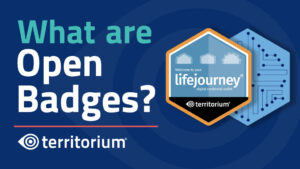Blog
Our latest insights on education, assessments, and employability.
Building Trust & Opportunity: Open Badges 3.0 and LifeJourney
Open Badges are digital, verifiable credentials that represent discrete achievements such as skills, competencies, micro-credentials, or degrees. They consist of a visual token paired with rich metadata that describes to whom it was issued, by whom, and under which criteria. Open Badges can even include evidence or demonstrations of the work.
They are more than pretty icons. They move achievements from siloed transcripts or resumes into portable, shareable formats. Learners can display them in digital wallets, on web profiles, or on social media. Employers, education institutions, and other stakeholders can verify them. That makes badges powerful tools for signaling verified skills and for boosting employability.
The Role of Interoperability
Without interoperability, credentials get trapped. If different systems don’t agree on formats, metadata standards, or how to exchange credential data, then learners may end up with badges that no one can validate or use. Open Badges solve this by having well-defined metadata and standard formats that are consistent across issuing platforms.
Interoperability also means that badges can align to competency frameworks or other credentialing structures. That alignment gives context and credibility. It allows employers to map badges to their actual needs. It lets educational institutions see equivalencies. It ensures that badges are meaningful, not just decorative.
What Makes Open Badges 3.0 Important
Open Badges 3.0 builds on prior versions with enhancements in verifiability, endorsement, and broader ecosystem support. It uses modern cryptographic methods to ensure that credentials are digitally signed, which increases trust and reduces fraud.
It also introduces an endorsement credential type. That means a third party, such as an accrediting body or licensing organization, can formally endorse an issuer or a badge, or even a skill claim made by a learner. That layer of trust amplifies credibility.
Furthermore, Open Badges 3.0 has more robust specifications for APIs to allow secure issuing, managing, verifying, and transferring of badges across platforms. That makes integration and scale much more feasible.
Verifiable Skills, Employability, and Learner Agency
Badges tied to evidence and digital signatures help in verifying what a learner claims to know or do. That matters in hiring, in further education, or for professional development. Employers can more reliably screen candidates if they can see proof, not just claims on a resume. Learners gain credibility.
Badges also give learners more control over what they collect and share. Because of interoperable standards and wallet-friendly formats, learners can aggregate and present credentials in ways that best reflect their strengths. That increases mobility, flexibility, and personal branding.
Why 1EdTech’s Open Badges Standard Matters
1EdTech builds and promotes education technology standards to ensure that digital tools work together. Their Open Badges standard ensures that badges are not proprietary black boxes but follow shared rules that foster trust, compatibility, and adoption.
Their specification documents, including Open Badges 3.0 implementation guides and conformance resources, give institutions and platforms clear paths for implementing badges correctly and interoperably. That reduces risk and helps scale.
Certification by trusted standards bodies means stakeholders can be confident that badges meet established quality and security criteria. That underpins acceptance and usage.
Introducing LifeJourney: A Complete Credentialing Solution
LifeJourney by Territorium is a platform that offers a full suite for credentialing. It includes:
- Learning and Employment Record (LER): captures and communicates learning and employment experiences.
- Comprehensive Learner Record (CLR): aggregates achievements, formal and informal, in verifiable digital form.
- Badging Platform: issues, manages, and verifies Open Badges, including 3.0, with aligned evidence, criteria, and endorsements.
- Digital Credential Wallet: allows learners to collect, store, share, and present credentials.
These components work together so learners don’t just earn badges. They build narratives of skills and achievements that are easily shared and verified.
How LifeJourney Leverages Open Badges 3.0 and Interoperability
By supporting Open Badges 3.0, LifeJourney ensures that badges issued are cryptographically signed, have standard metadata, support endorsements, and integrate via secure APIs. That ensures trust, compatibility, and broad recognition.
Interoperability means the LER, CLR, badge platform, and wallet can all communicate. Credentials from any issuer using the standard can flow into LifeJourney. Learners have control over sharing, and institutions and employers can inspect verifiable data.
The Bigger Picture: Why This Matters for Education and Workforce
In a fast-changing economy, skills are evolving. Employers often look for verified skills rather than just degrees. Micro-credentials, skills badges, and continuous learning are becoming more central. A system built on Open Badges 3.0 gives learners flexibility, accelerates mobility, and increases recognition.
Education providers who adopt standards like those from 1EdTech benefit because their credentials can be more widely accepted. Employers benefit because the process of screening and matching talent becomes clearer. Learners benefit because they get recognized for a wider range of achievements, not just traditional ones.

